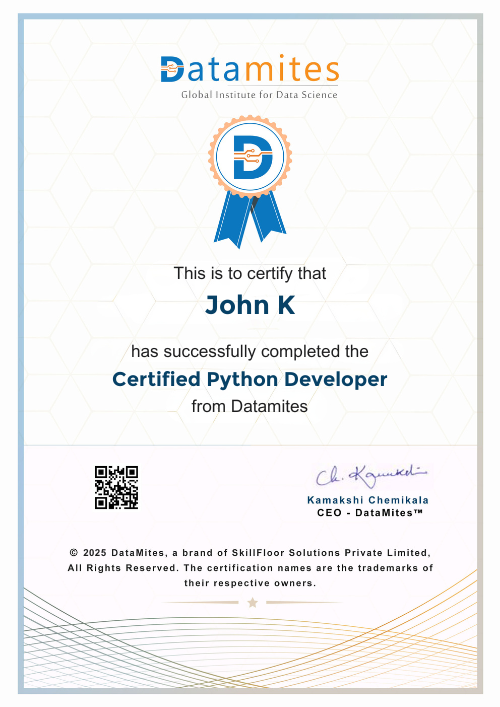Instructor Led Live Online
Self Learning + Live Mentoring
Customize Your Training

• Introduction of python
• Installation of Python and IDE
• Python Variables
• Python basic data types
• Number & Booleans, strings
• Arithmetic Operators
• Comparison Operators
• Assignment Operators
• IF Conditional statement
• IF-ELSE
• NESTED IF
• Python Loops basics
• WHILE Statement
• FOR statements
• BREAK and CONTINUE statements
• Basic data structure in python
• Basics of List
• List: Object, methods
• Tuple: Object, methods
• Sets: Object, methods
• Dictionary: Object, methods
• Functions basics
• Function Parameter passing
• Lambda functions
• Map, reduce, filter functions
• Decorators
• Generators
• Context Managers
• Metaclasses
• Inheritance and Polymorphism
• Encapsulation and Abstraction
• Class methods and static methods
• Special (magic/dunder) methods
• Property decorators - getters, setters, and deletes
• Working with files
• Reading and writing files
• Buffered read and write
• Other file methods
• Logging & Debugger
• Modules and import statements
• SQL Basics
• Creating DB Table
• INSERT, READ, UPDATE, DELETE
• Introduction to MongoDB
• CRUD operations in MongoDB
• namedtuple(), deque, ChainMap,
• Counter, OrderedDict, defaultdict,
• UserDict, UserList, UserString
• Exceptions handling with try-except
• Custom exception handling
• List of general use exception
• Best practice exception handling
• Generators, Iterators
• The Functions any and all
• With Statement
• Data Compression
• A Daytime Server
• Clients and Servers
• The Client and Server Programs
• Classes and Threads
• Multi-threading; thread life cycle
• Regular Expression Syntax
• Group, Split and wildcards
• Quantifiers
• Match, Search and Find all methods
• Character Sequence
• Introduction to OpenCV, Installation
• Basic Operations on Images
• Image Filtering
• Image Classification
• Introduction to GIT
• Basic Git commands
• Introduction to Flask and Installation
• Creating project
• Routing,templates, forms and database integration
• Deployment on render
• Django Introduction and Installation
• Creating a Project
• Django Architecture and File Structure
• Folder Structure, First Django project
• Database and Views, Static Files and Forms
• URL Mapping and Routing
• Defining Models and Relationships
• Database Migrations and Schema Changes
• Querying Data using Django ORM
• Model Forms and Form Validation
• HTML Forms in Django
• Model Forms and Form Validation
• Formsets and Inline Formsets
• File Uploads and Validation
• Deploying Django Applications
• Hosting Options (e.g., Heroku, AWS)
• Project Showcasing and Review
Python is a versatile, high-level programming language known for its simplicity and readability. It's widely used in various fields including web development, data analysis, artificial intelligence, and more.
Transitioning into Python programming involves learning the language fundamentals through online courses, tutorials, or books. Practice by working on personal projects and contribute to open-source projects to gain practical experience.
In Kenya, the demand for Python developers is steadily increasing due to its versatility and applicability across different industries, including tech startups, finance, and e-commerce.
Job prospects for Python developers in Kenya are promising, with opportunities available in various sectors such as software development, data analysis, and machine learning.
Employers seek Python developers with strong proficiency in Python programming, problem-solving abilities, knowledge of relevant libraries and frameworks, good understanding of data structures and algorithms, and effective communication skills.
Key responsibilities of a Python developer include writing efficient and maintainable code, collaborating with cross-functional teams, designing and implementing software solutions, and troubleshooting technical issues.
Python is utilized in agriculture for tasks such as data analysis, crop monitoring, weather forecasting, and automation of farming processes through IoT devices and sensors.
Transitioning to a Python developer role involves learning Python programming fundamentals, gaining hands-on experience through personal projects, and networking with professionals in the field.
To kickstart a python career in Kenya, one can start by learning Python programming, building a strong portfolio showcasing projects, networking with professionals in the industry, and applying for entry-level positions or internships.
Python Developers in Kenya earn competitive salaries, averaging 1,770,000 KES annually, according to data from Salary Explorer.
Yes, certifications can be valuable for Python developers in Kenya. While practical skills and experience are often paramount, certifications can demonstrate a candidate's commitment to learning and proficiency in Python programming
To become a certified python developer, one can prepare for certification exams through self-study using official study guides, online courses, and practice tests. After thorough preparation, candidates can register for the exam and demonstrate their proficiency in Python programming.
Educational qualifications for Python jobs in Kenya vary, but typically a bachelor's degree in computer science, information technology, or a related field is preferred. However, practical experience and demonstrable skills are often valued equally or more.
Debugging Python code involves using tools like print statements, debugging modules like pdb, or integrated development environments (IDEs) with built-in debugging features to identify and fix errors in the code.
Python and R are both popular languages for data analysis. Python is more versatile and widely used in various domains beyond data analysis, while R is specialized for statistical computing and graphics.
Many tech giants like Google, Facebook, Amazon, and Microsoft use Python extensively for various purposes including web development, data analysis, artificial intelligence, and automation.
Python is used in aerospace for tasks such as simulation and modeling, data analysis, control systems, and automation of spacecraft operations and testing.
Python is used in telecommunications for network automation, performance monitoring, data analysis, and development of communication protocols and applications.
Yes, Python is widely used in cybersecurity for tasks such as penetration testing, malware analysis, network security monitoring, and development of security tools and scripts.
Some common python interview questions include topics like data types and structures, object-oriented programming concepts, algorithms and problem-solving, and proficiency in Python libraries and frameworks relevant to the job role.
To advance your Python programming skills in Kenya, consider enrolling in training programs offered by DataMites. They provide tailored courses suitable for beginners and professionals, fostering hands-on learning experiences to improve your proficiency.
Opting for DataMites for Python training in Kenya offers several benefits, including globally recognized certifications, expert instructors, updated curriculum, and practical projects, ensuring a comprehensive learning experience aligned with industry standards.
The Python Developer Course in Kenya at DataMites spans 4 months, totaling 400 learning hours. This extended timeline enables participants to grasp Python concepts thoroughly and excel in software development.
DataMites' Python Developer Training in Kenya caters to individuals with no prior programming experience, offering them the opportunity to acquire essential skills for Python development roles.
The Flexi-Pass feature allows participants to choose between weekday or weekend batches, providing flexibility to manage learning alongside other commitments during the Python training program in Kenya.
DataMites' Python for Data Science Course in Kenya explores Python's application in data manipulation, analysis, and machine learning, providing practical skills for real-world data scenarios.
DataMites' Data Mining with Python Training in Kenya delves into data mining techniques using Python, equipping participants to extract insights from large datasets and make informed decisions.
The cost of Python training in Kenya at DataMites ranges from KES 26,959 to KES 69,822, ensuring accessibility and affordability for participants with different budget constraints.
DataMites' Python for Machine Learning Course in Kenya introduces various machine learning algorithms and their implementation using Python's Scikit-Learn package, fostering proficiency in building ML applications.
DataMites' Python for Deep Learning Course in Kenya introduces participants to deep learning concepts, enabling them to build and train deep neural networks using Python libraries like TensorFlow and PyTorch.
Yes, DataMites offers projects as part of its Python Training in Kenya, providing practical experience and opportunities to apply Python skills in real-world scenarios.
Yes, DataMites offers Python courses with internship opportunities in Kenya, allowing participants to gain practical experience and enhance their employability in the field.
Yes, upon completion of Python classes in Kenya with DataMites, participants receive IABAC Certification, validating their proficiency in Python programming and enhancing their credibility in the industry.
Participants need to bring a valid photo identification proof, such as a national ID card or driver's license, for obtaining the participation certificate during Python training sessions in Kenya.
DataMites' Python developer training in Kenya covers essential tools such as Anaconda, Google Colab, Numpy, Pandas, PyCharm, and Flask, facilitating effective Python application development.
If a participant misses a training session in Kenya, they can access recorded sessions and course materials online and schedule makeup sessions to stay on track with their learning.
Yes, DataMites offers a demo class for prospective participants in Kenya, allowing them to experience the teaching methodology and assess the course content before committing to enrollment.
DataMites' Python courses in Kenya accept various payment methods, including cash, debit/credit cards, EMI, PayPal, and net banking, ensuring convenience for participants.
DataMites' career mentoring sessions in Kenya offer personalized guidance on resume building, interview preparation, and career goal setting, provided by industry experts to support participants in their career advancement.
The Certified Python Developer Course in Kenya by DataMites covers a wide range of Python programming aspects, including practical exposure through internships and live projects with IT companies, ensuring participants are industry-ready.
The DataMites Placement Assistance Team(PAT) facilitates the aspirants in taking all the necessary steps in starting their career in Data Science. Some of the services provided by PAT are: -
The DataMites Placement Assistance Team(PAT) conducts sessions on career mentoring for the aspirants with a view of helping them realize the purpose they have to serve when they step into the corporate world. The students are guided by industry experts about the various possibilities in the Data Science career, this will help the aspirants to draw a clear picture of the career options available. Also, they will be made knowledgeable about the various obstacles they are likely to face as a fresher in the field, and how they can tackle.
No, PAT does not promise a job, but it helps the aspirants to build the required potential needed in landing a career. The aspirants can capitalize on the acquired skills, in the long run, to a successful career in Data Science.



